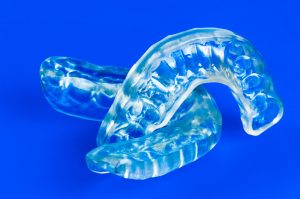 Don’t know the difference between TMD and TMJ? These terms are used frequently in dentistry, but you’re not alone if you aren’t quite sure what they stand for—especially since many people use the terms interchangeably. However, TMJ refers to your temporomandibular joint, while TMD refers to a problem with that joint, or temporomandibular disorder.
Don’t know the difference between TMD and TMJ? These terms are used frequently in dentistry, but you’re not alone if you aren’t quite sure what they stand for—especially since many people use the terms interchangeably. However, TMJ refers to your temporomandibular joint, while TMD refers to a problem with that joint, or temporomandibular disorder.
But what is that, really?
The TMJ is the joint on either side of your mouth that connects your jaw to your skull. When you open and close your mouth, chew, or talk, you are using your TMJ. If you are having problems with the TMJ and surrounding muscles, you suffer from TMD—a disorder or dysfunction of the TMJ.
If you’re experiencing TMD/TMJ problems, you’re likely feeling pain in your jaw (especially on or around the TMJ), in addition to headaches, neck pain, or non painful but annoying symptoms like popping or locking jaws.
New Patient Offer
Free Limited Exam and X-Ray
($165 value)
Call 513-791-8880 or email us using this form to schedule an appointment or for more details.
Get TMD/TMJ Treatment in Montgomery Today!
Visit us today in Cincinnati, also serving Blue Ash and Montgomery, to cure headaches, jaw pain, and other symptoms caused by TMD.
How Do I Know If I Have TMD?
There are several signs that you might be suffering from TMD. They include:
- Headaches and Earaches: When your TMJ and surrounding muscles become inflamed, aches can radiate from your ear, causing headaches and ear discomfort.
- Facial Discomfort: Your face might feel uncomfortable, tight, or you might see swelling on the side of your face. When your jaw muscle is overworked or strained, the pain can affect your entire face and neck.
- Clicking of the Jaw: When you open and close your mouth, you may hear and feel your jaw click as a result of a misaligned or strained jaw.
- Tired Jaw: Talking and chewing can tire your jaw quickly, causing jaw fatigue. This is a sign that your jaw muscle might be strained or overtired from clenching and grinding.
- Stuck or Lockjaw: Your jaw may become stuck, or locked in place. This can happen when you open your mouth widely, such as while yawning. This symptom can be very alarming, but usually isn’t painful. If you aren’t sure whether you’re suffering from TMD, call us today! A professional diagnosis is the best way to get your oral health under control and get on track alleviating any jaw pain or headaches you’ve been living with.
“
I have TMJ and my previous dentist never took my concerns seriously. I’m so glad I found Endres because they actually helped treat my TMJ and are always careful to not cause discomfort to my jaw during cleanings.
”
Grinding Teeth (Bruxism)
TMJ disorder side effects are often caused when you grind your teeth at night or even during the day when you are involved in stressful situations. Jaw clenching and teeth grinding are also referred to as bruxism and can lead to more serious issues like chronic headaches, teeth damage, and jaw malfunctions.
Bruxism Mouth Guard
 If you are experiencing tension headaches or jaw discomfort, you may have issues with bruxism. With regular dental checkups, Dr. Endres can spot the signs of teeth grinding before significant damage is done. If you are clenching your jaw at night, we can provide you with a custom-fit mouthguard to reduce the damage being done to your teeth and help eliminate headaches that can result from grinding your teeth. In some cases, the mouthguard can also help to improve your breathing for a better night’s sleep.
If you are experiencing tension headaches or jaw discomfort, you may have issues with bruxism. With regular dental checkups, Dr. Endres can spot the signs of teeth grinding before significant damage is done. If you are clenching your jaw at night, we can provide you with a custom-fit mouthguard to reduce the damage being done to your teeth and help eliminate headaches that can result from grinding your teeth. In some cases, the mouthguard can also help to improve your breathing for a better night’s sleep.
Botox For Migraines and Jaw Pain
 Because Botox and Juvéderm relax muscles, Dr. Endres can use Botox for migraines and other pain cause by TMJ disorder. A quick Botox or Juvéderm injection can potentially stop your jaw pain and prevent any future TMD problems!
Because Botox and Juvéderm relax muscles, Dr. Endres can use Botox for migraines and other pain cause by TMJ disorder. A quick Botox or Juvéderm injection can potentially stop your jaw pain and prevent any future TMD problems!
How Can Botox and Juvéderm Treat TMDs?
Some of the most common causes of TMD and TMJ pain are jaw clenching and grinding. Because clenching and grinding often happen at night when people are deeply asleep, most people aren’t aware they are doing anything wrong—which makes it very difficult to solve the problem!
A Botox or Juvéderm injection relaxes jaw muscles and relieves tension in those muscles. When these jaw muscles are relaxed with the help of a dermal filler, they are unable to go through the motions of clenching and grinding. A relaxed jaw at night can go a long way toward improving your jaw health and preventing pain.
If you experience chronic pain, we know how it can disrupt your life. Dermal filler treatments may help manage that pain, and we are happy to be able to offer this alternative treatment for TMD and its associated pains and headaches.
“
I couldn’t recommend Dr Endres and her staff enough for taking care of my teeth. I have been getting Botox done by her for years to help with my TMJ pain and it has done wonders in improving the condition.
”
Benefits of TMD/TMJ Treatment
From reduced discomfort and swelling to less jaw fatigue when eating, TMD/TMJ treatment can improve your quality of life. When you’re not suffering headaches or worrying about your jaw locking up, you can feel better about your day.
There’s no need to live life with headaches, chronic jaw pain, locking, or popping. You deserve the comfort and peace of mind that comes from effective TMD/TMJ treatment!
Benefits of Visiting a Dentist With a TMD/TMJ Focus
TMD/TMJ problems can be complex, and every person experiences symptoms differently; some people might have headaches, while others might have a popping jaw. A dentist who is experienced in treating TMD/TMJ issues will naturally have more success in diagnosing and treating these problems than a less experienced dentist.
A timely, accurate diagnosis can make a huge difference to your quality of life and overall health! Dr. Endres has emphasized TMD/TMJ treatment for years, and her dental team is familiar with a wide range of TMD causes and solutions.
No matter what your TMD/TMJ experience might be, we have the experience and qualifications needed to help you conquer your symptoms and improve your jaw health.
Visit us today in Cincinnati, including Montgomery and Blue Ash, to cure headaches resulting from TMD/TMJ. We truly understand jaw pain and we are here to help at Endres Gateway Dentistry with our treatment options!
What Treatments Cure Headaches?
-
Home Remedies
- Over-the-counter (OTC) Medication: Naproxen and Ibuprofen are two OTC medications that bring down muscle swelling and can alleviate discomfort.
- Cold Packs: Using an ice pack against your jaw and temple for short intervals may alleviate swelling and provide pain relief.
-
Professional Remedies
- NightGuard: A custom mold that fits over your teeth and helps prevent nighttime grinding, a common cause of TMD. This NightGuard will also protect your teeth from the wear and tear that comes from regular nighttime grinding.
- Dental Work: TMD discomfort can sometimes be relieved with dental work, such as replacing missing teeth, crowns, or braces. Depending on your needs, this dental work might be designed to improve your jaw alignment or to protect and restore damaged teeth.
- Surgery: In extreme cases, surgery may be recommended. There are multiple surgery options available for TMD/TMJ problems depending on a patient’s specific needs, and all of these methods will improve your jaw health and stop any TMD/TMJ pain in its tracks.
-
Cosmetic Remedies
-
- Invisalign Braces: Invisalign braces work just like traditional braces, which means they gradually shift teeth into a healthier, straighter position. If you have a misaligned bite that is contributing to your TMD/TMJ problems, this readjustment that comes with Invisalign braces can improve your bite and improve or eliminate your TMD/TMJ symptoms.
- Crowns: The regular teeth grinding that often accompanies TMD/TMJ problems can dramatically wear on your teeth. If your teeth are substantially worn down by regular grinding, dental crowns can improve the appearance of your smile and improve your jaw health and the alignment of your bite.
Cure Headaches Today!
Let Endres Gateway Dentistry in Cincinnati, including Blue Ash and Montgomery diagnose and treat your TMD. Call for your appointment now!